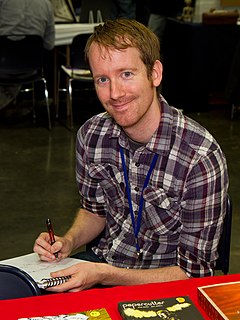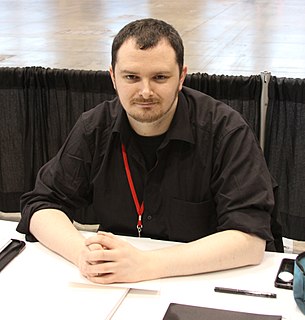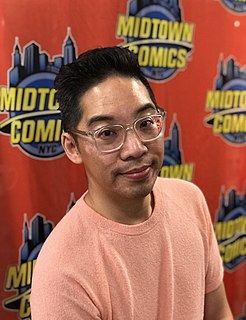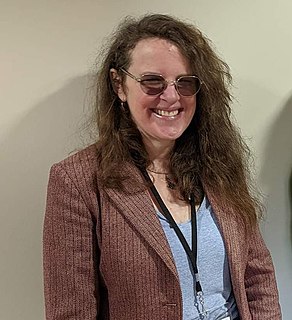A Quote by Nate Powell
The comics I made from 1990 to 1997 were largely based in vaguely urban, vaguely dystopic settings because that was my reference point for comics storytelling in general.
Related Quotes
That's the type of thing you need to keep in mind when drawing comics. The storytelling. Consider the action and the space available to you, that's what will make it a great comics page. Once you've figured that out, you can always find/make the reference to support your storytelling decisions. So by all means, study film, but as with any reference, the results are better when they inform the craft and not dictate it.
There are a lot of good comics, no doubt, but as far as the quality of the comics goes, I think what you have is a bunch of situational comics - there are black comics that work only black crowds, gay comics that do only gay crowds, and southern comics that only work down South, and so on with Asian, Latino, Indian, midgets, etc. The previous generation's comics were better because they had to make everybody laugh.
The lovely thing about writing comics for so many years is that comics is a medium that is mistaken for a genre. It's not that there are not genres within comics, but because comics tend to be regarded as a genre in itself, content becomes secondary; as long as I was doing a comic, people would pick it up.
In early comics, you see the amazing awkwardness and bizarre reasoning in the storyline, and it's because comics hadn't really been invented yet. There was no format for them to follow. They were just making it up. So I try to incorporate that kind of awkwardness in my comics quite frequently, which is odd. In some ways, I can't be as awkward as I'd like. But I do think that's one way in which my comics are unusual, because I will try to make the artwork look bad, occasionally.
Storytelling is one of comics' esthetic hurdles at the moment, which was the novelist's problem 150 years ago: namely, to take comics from storytelling into that of "writing," the major distinction between the two to me being that the former gives one the facts, but the latter tries to recreate the sensation and complexities of life within the fluidity of consciousness and experience. As far as I'm concerned, that's really all I've been trying to do formally for the past decade or more with comics, and it's certainly time-consuming, since it has to be done with drawings, not words.
I quit comics because I got completely sick of it. I was drawing comics all the time and didn't have the time or energy to do anything else. That got to me in the end. I never made enough money from comics to be able to take a break and do something else. Now I just can't stand comics. . . . I wish my work would be recognized by a larger crowd of people as more art than be stuck with the cartoonist label for the rest of my life.
When I was a kid, back in the '40s, I was a voracious comic book reader. And at that time, there was a lot of patriotism in the comics. They were called things like 'All-American Comics' or 'Star-Spangled Comics' or things like that. I decided to do a logo that was a parody of those comics, with 'American' as the first word.
Underground comics were produced by individuals - they were the auteur variety, rather than the production-line sort of comic book aimed at pleasing a vast general audience. Mainstream comics never appealed to me: they seemed sterile in their stylistic consistency, and were quickly consumed, the stories interesting only for so long as you were reading them.
I was going to be a storybook illustrator or an editorial illustrator. I ended up in a comics class by mistake because all the others were full, so I was like 'I'll stay for one class, and then I'll go take something else, because I don't care about comics.' I got pulled in really fast; I discovered I had a voice in comics that I didn't know I had.







































